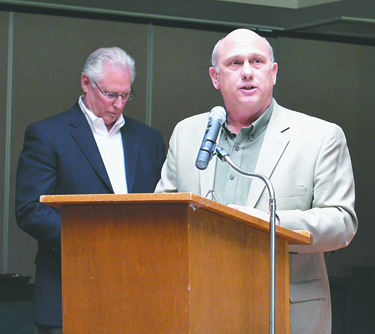SEQUIM –– Two top city officials told a business audience Tuesday that the city government is doing its best to support business.
Despite coffee shop chatter, the city does not have an anti-business attitude, said City Manager Steve Burkett and Mayor Ken Hays as they delivered a state-of-the-city address to a Sequim-Dungeness Valley Chamber of Commerce luncheon gathering.
“To me, that would be like shooting ourselves in the foot,” Burkett said.
“If folks aren’t able to, in our case, buy things at Costco and pay sales taxes, then the city’s not going to be in good financial shape,” he added.
The city, the two said, is committed to putting into place services that make it easier to do business in Sequim.
Hays said city officials are working to manage Sequim’s growth from a small town to a city.
“It’s a complex process,” Hays said.
“The more we grow, the more people move here, the more complicated things become, quite honestly,” Hays said.
The number of businesses licensed by Sequim in 2013 is 1,251, Burkett said.
That figure is 22 percent higher than in 2010 and higher than the 1,169 businesses licensed in the city in 2006, before the Great Recession.
Sequim Realtor Marguerite Glover, though, questioned those numbers.
Glover said individual Realtors, for example, now have to have business licenses in addition to the real estate office.
That recent requirement, she said, inflated the number of the city’s business licenses.
“It added to those figures,” she said. “There’s a lot more things that are in there than the actual concrete building or restaurant.”
“Yeah. You’re right,” Burkett said.
“I guess it’s come down to, do we believe that Sequim is a good place?”
One of the most prominent examples cited by critics of the city’s business policies, Burkett said, is the story of the Crumb Grabbers Bakery, 492 W. Cedar St.
The city initially told owner Linda Engeseth she would have to pay a $17,000 traffic impact fee when she moved into her new location in 2011.
Instead, she closed at 4 p.m. to avoid peak traffic times laid out in a manual produced by the Institute of Traffic Engineers.
A year later, Engeseth asked the city to rethink the closing time mandate and was told she would be able to stay open until 6 p.m.
The fee, Burkett said, was instituted to help pay the increased cost of more traffic.
“One of the most negative consequences of rapid growth is increased traffic,” Burkett said.
“It’s one of the things, I think, that irritates people the most about more people living in your community.”
He noted that Engeseth never had to pay the fee, and the city is now revisiting the rule.
Another recent hot topic has been signage in front of businesses.
Hays said the city “was compelled” to make new rules about signage after a court ruling and a proliferation of signs for gold buyers.
After a half-dozen meetings with the community, the city crafted new rules that officials thought were satisfactory.
Those rules were designed to reflect the different speeds at which people now travel through the city, he said, which are different than when many of the businesses on Washington Street were built.
“Most people don’t really understand how signage works,” Hays said.
“The types of signs that might have made sense, if they ever made sense, are different today than they were in the 1960s and early 1970s.”
Recently, the city came under criticism because it would not let Linda Chamness change the pole sign in front of her auto detailing shop’s new location in the historic Texaco station at 154 E. Washington St.
Chamness had asked the city to let her replace the sign that advertises lube and filter services she doesn’t offer with one advertising her Skunkworks detailing shop.
Letting her do that, Hays said, would be a “step backward.”
“Regarding the abandoned Texaco station that now has a temporary use in it, most cities do have the same ordinance that we have that says when a use is vacated for more than a year, you lose all privileges and rights.”
Hays noted the city since the 1970s has put in policies aimed at removing the pole signs that businesses put in front of their locations to draw in traffic when Washington Street used to be U.S. Highway 101.
“Sequim is not a drive-through community anymore,” Hays said.
Hays related the efforts the city made to help Pacific Northwest National Laboratories, also know as Battelle, expand its Marine Sciences Laboratory facilities in east Sequim.
The city worked for three years, he said, to line up its efforts to extend utilities to the company’s facilities, even going so far as to hire a lobbyist to curry funding from the federal government for the extension.
Annexing Battelle’s property to allow the company to expand was one of the first goals of the current City Council, he said.
But Battelle’s leaders, Hays said, canceled those expansion efforts when federal politics brought its research funding into question.
“Quite honestly, I’m very disappointed in their response to our efforts,” Hays said.
Sequim-Dungeness Valley Editor Joe Smillie can be reached at 360-681-2390, ext. 5052, or at jsmillie@peninsuladailynews.com.

